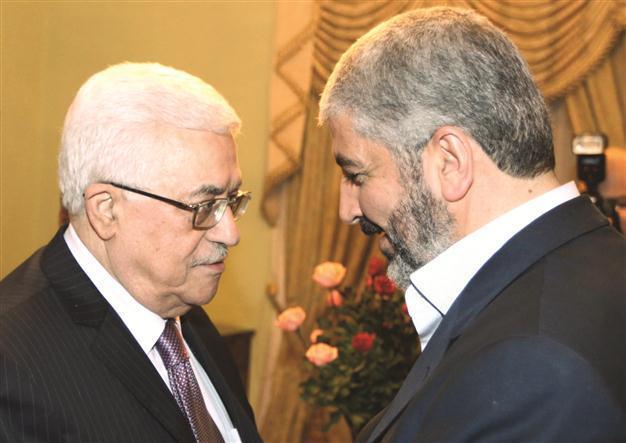Hamas’ PLO move solidifies Palestine unity
CAIRO

Palestinian President Abbas (L) meets with the leader of Fatah movement Mashaal. Hamas spokesman says Palestinian factions had reached agreement on six steps to be taken as part of reconciliation talks. AFP photo
Divided Palestinian factions Fatah and Hamas appear set to patch up their differences following a Dec. 21 meeting in Egypt in which they agreed to establish a unity government and a number of joint commissions ahead of May elections.“We agreed on the need to convene the Palestinian Legislative Council [PLC] in early February,” independent deputy Mustafa Barghouti told Agence France-Presse. Delegates agreed to set up a new electoral commission Dec. 20 and also set a deadline for the formation of a caretaker Cabinet of independents as envisaged in a May agreement.
Palestinian President Mahmoud Abbas of Fatah and Hamas leader Khaled Mashaal met for the second time in less than a month in Cairo on Dec. 21 as part of reconciliation efforts between the rival groups.
The two men arrived in the Egyptian capital during the evening and began talks shortly afterwards, said Azzam al-Ahmed, Abbas’ Fatah delegation head. All the main Palestinian factions, led by Hamas and Fatah, have been meeting in the Egyptian capital seeking ways to implement a reconciliation deal signed in May.
Earlier that day, delegates discussed ways to reactivate the Palestinian national Parliament and the PLC, which has been paralyzed since 2007 when Hamas pushed Fatah forces out of the Gaza Strip, splitting the Palestinian territories into two rival administrations.
During the talks, the factions agreed to form a nine-member Central Election Commission (CEC) under the committee’s current head, Hanna Nasser. Hamas spokesman Fawzi Barhoum also said Palestinian factions had reached agreement on six steps to be taken as part of ongoing reconciliation talks, Ma’an news agency reported.
Unity government by January 2012
Abbas, who has said elections will be held in May, will have to approve the composition of the CEC, al-Ahmed said. Despite the success of the recent talks, the factions have postponed debate on two key issues, namely, the formation of an interim government and unifying the disparate security forces, al-Ahmed said.
But the various factions agreed that a unity government should be sworn in by the end of January 2012. Talks were under way “to resolve the problem of the government,” while a reform of the security services would be tackled only after a Cabinet had been formed, Barghouti said.
Hamas confirmed the Fatah timeline in a statement, saying it also hoped “to secure the release of political prisoners before the end of January.” Yesterday, Abbas was expected to preside over a high-level meeting to discuss reforming the Palestine Liberation Organization (PLO) to allow Hamas and Islamic Jihad to join.
Mashaal and Islamic Jihad chief Ramadan Shallah were also expected to attend the talks along with all the other faction heads, members of the PLO Executive Committee and the speaker of the Palestinian National Council, Salim al-Zaanoun.
The May reconciliation deal signed by the two former rivals called for the establishment of a caretaker Cabinet which would prepare for legislative and presidential elections within a year.
















